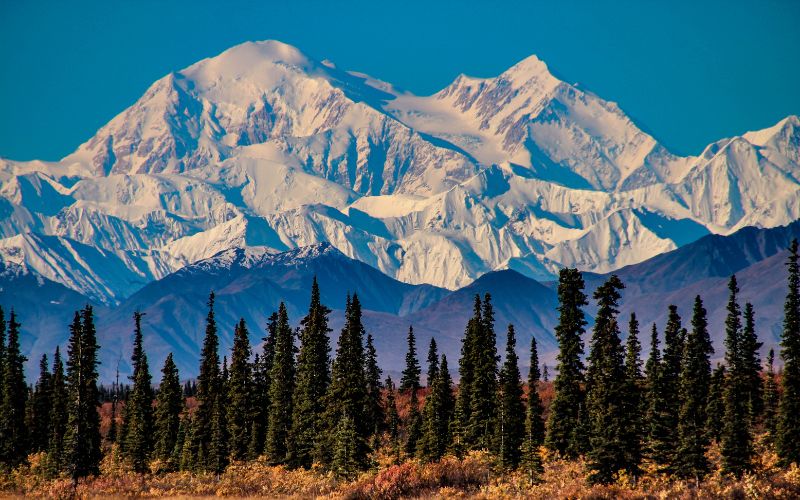
- Details
- By Kaili Berg
On January 20, President Donald Trump signed an executive order to rename Denali, North America’s tallest peak, back to its former name, Mount McKinley.
The decision reverses a landmark 2015 action by President Barack Obama that restored the mountain’s Indigenous name, Denali, which means “the high one” in the Koyukon Athabaskan language.
The executive order cites “a need to honor the legacy of President William McKinley, whose leadership helped shape modern America,” as justification for the name change. It directs the Department of the Interior to implement the renaming across federal agencies within 30 days.
“A short time from now, we are going to be changing the name of the Gulf of Mexico to the Gulf of America,” Trump said in his inaugural address. “And we will restore the name of a great president, William McKinley, to Mount McKinley, where it should be and where it belongs.”
The order also claims to “restore historical accuracy” by reestablishing the name given to the mountain by gold prospectors in the late 19th century. However, the move has sparked backlash from Indigenous groups, lawmakers, and cultural advocates who see it as an affront to Native heritage.
“It’s not that former President McKinley doesn’t deserve recognition or some form of tribute. There are plenty of places, in Ohio or across the country, where McKinley can be honored,” Senator Lisa Murkowski, chair of the Senate Committee on Indian Affairs told Native News Online. “Even in Alaska, there are ways we could recognize him if we chose to. In fact, we already do. However, the effort to return the mountain to what I consider a temporary name is, in my view, misguided.”
The Athabaskan people, who have lived in Alaska for over 10,000 years, hold Denali as a sacred site. For the Den'a — or Koyukon Athabanskans — whose ancestral home includes the area surrounding the mountain, Denali is a central figure in their oral traditions and spirituality.
In 1896, a prospector in Alaska named the mountain after William McKinley, then a presidential candidate who had no connection to Alaska. This renaming, imposed without input from the region’s Native inhabitants, erased their cultural connection to the peak.
In 2015, after decades of advocacy by Alaska Native organizations and state leaders, the U.S. Board on Geographic Names and President Obama restored the name Denali, celebrating it as a moment of reconciliation with Indigenous history.
In response to the executive order, Alaska Native organizations, including the Tanana Chiefs Conference and the Alaska Federation of Natives, have launched efforts to block the renaming. These initiatives include gathering public signatures through online petitions and organizing awareness campaigns.
“Right now, the feedback we’re receiving from people back home and from the tribes is almost unanimous in its concern about reverting the name,” Murkowski said.
Denali, at 20,310 feet, is not only the tallest peak in North America but also a critical cultural and economic landmark for Alaska. The mountain is the centerpiece of Denali National Park, which attracts over 600,000 visitors annually and generates more than $600 million for the state’s economy.
Many tourism operators have voiced concerns that changing the name back to Mount McKinley could confuse international visitors and diminish the mountain’s symbolic value as a place of Indigenous pride.
“When we think about American greatness, it includes individuals who have had a political impact on our country,” Murkowski said. “But I cannot think of a better way to honor the greatness of Indigenous peoples—those who stewarded the land around this mountain for tens of thousands of years—than by preserving the traditional name they gave it. That’s how we honor the greatness of these Americans.”
As opposition continues, the future of Denali’s name remains uncertain. Legal experts have suggested that the order could be challenged under federal laws protecting Native cultural heritage.
More Stories Like This
Klamath Indigenous Land Trust Purchases 10,000 Acres as Salmon ReturnTrump signs law that revokes some limits on drilling in Alaska’s National Petroleum Reserve
Southern Sierra Miwuk Nation Gets 900-Acres ofLand Back
Chilkat Indian Village Tells New Palmer Mine Owners They Are “Not Welcome” in Chilkat Valley
Tribes, Coastal Group Ask Army Corps to Revoke Permit for Texas Export Terminal
Help us defend tribal sovereignty.
At Native News Online, our mission is rooted in telling the stories that strengthen sovereignty and uplift Indigenous voices — not just at year’s end, but every single day.
Because of your generosity last year, we were able to keep our reporters on the ground in tribal communities, at national gatherings and in the halls of Congress — covering the issues that matter most to Indian Country: sovereignty, culture, education, health and economic opportunity.
That support sustained us through a tough year in 2025. Now, as we look to the year ahead, we need your help right now to ensure warrior journalism remains strong — reporting that defends tribal sovereignty, amplifies Native truth, and holds power accountable.
 The stakes couldn't be higher. Your support keeps Native voices heard, Native stories told and Native sovereignty defended.
The stakes couldn't be higher. Your support keeps Native voices heard, Native stories told and Native sovereignty defended.
Stand with Warrior Journalism today.
Levi Rickert (Potawatomi), Editor & Publisher


